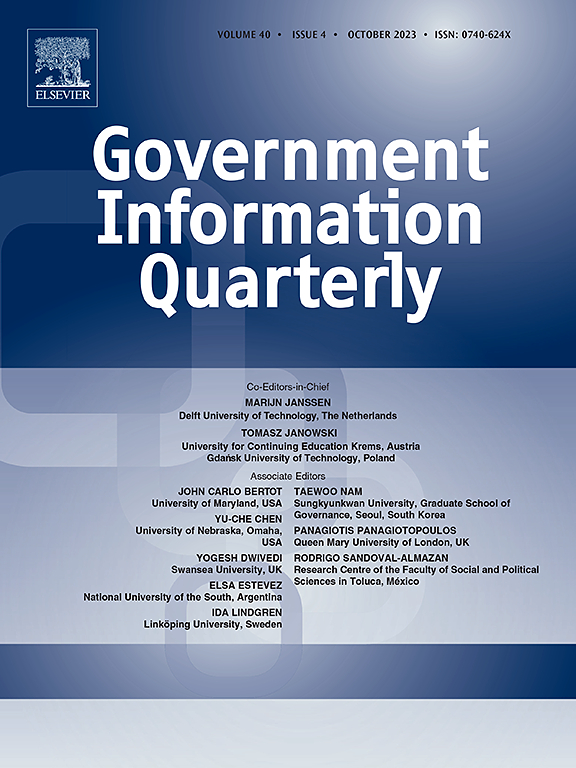开放政府数据(OGD)作为智慧城市发展的催化剂:来自中国城市的经验证据
IF 10
1区 管理学
Q1 INFORMATION SCIENCE & LIBRARY SCIENCE
引用次数: 0
摘要
虽然现有的智慧城市模型认识到数据的重要性,但它们往往忽视了开放政府数据(OGD)在城市发展中的具体作用。本研究通过调整智慧城市模型,明确将OGD作为关键组成部分纳入其中,从而解决了这一差距。利用2022-2024年中国城市数字化演进指数的面板数据,我们运用结构方程模型(SEM)实证检验了OGD、数字基础设施和数字经济对智慧城市发展的直接和间接影响。我们的分析确定了四个关键途径,揭示了数字基础设施对智慧城市发展的直接积极影响,而包含OGD的间接途径表现出更强的影响。OGD在显著提升数字经济和数字基础设施以及直接促进智慧城市发展方面发挥着关键作用。本研究通过超越对单个组成部分的讨论,以经验检验这些要素之间的关系,为智慧城市文献做出了贡献。通过将OGD定位为催化剂,我们提供了对数据驱动计划增强智慧城市发展的机制的细致理解。我们的研究结果为OGD作为城市创新驱动力的多方面方式提供了有价值的见解,挑战了将政府数据视为被动资源的传统观点。本研究强调了OGD作为决策者寻求利用数据驱动型城市治理潜力的战略资产的重要性。最后,我们提出了利用OGD支持可持续、高效的智慧城市发展的政策建议。本文章由计算机程序翻译,如有差异,请以英文原文为准。
Open Government Data (OGD) as a catalyst for smart city development: Empirical evidence from Chinese cities
While existing smart city models recognize the importance of data, they often overlook the specific role of Open Government Data (OGD) for urban development. This study addresses this gap by adapting the Smart City Model to explicitly include OGD as a critical component. Drawing on panel data from the 2022–2024 Chinese Cities Digitalization Evolution Index, we employ Structural Equation Modeling (SEM) to empirically examine the direct and indirect effects of OGD, digital infrastructure, and digital economy on smart city development. Our analysis identifies four key pathways, revealing that while digital infrastructure positively influences smart city development directly, the indirect pathways incorporating OGD demonstrate stronger effects. OGD plays a pivotal role by significantly enhancing the digital economy and digital infrastructure, as well as directly contributing to smart city development. This research contributes to the smart city literature by moving beyond discussions of individual components to empirically test the relationships between these elements. By positioning OGD as a catalyst, we provide a nuanced understanding of the mechanisms through which data-driven initiatives empower smart city development. Our findings offer valuable insights into the multifaceted ways OGD serves as a driving force for urban innovation, challenging the traditional view of government data as a passive resource. This study highlights the importance of OGD as a strategic asset for policymakers seeking to harness the potential of data-driven urban governance. We conclude with policy recommendations for leveraging OGD to support sustainable and efficient smart city development.
求助全文
通过发布文献求助,成功后即可免费获取论文全文。
去求助
来源期刊

Government Information Quarterly
INFORMATION SCIENCE & LIBRARY SCIENCE-
CiteScore
15.70
自引率
16.70%
发文量
106
期刊介绍:
Government Information Quarterly (GIQ) delves into the convergence of policy, information technology, government, and the public. It explores the impact of policies on government information flows, the role of technology in innovative government services, and the dynamic between citizens and governing bodies in the digital age. GIQ serves as a premier journal, disseminating high-quality research and insights that bridge the realms of policy, information technology, government, and public engagement.
 求助内容:
求助内容: 应助结果提醒方式:
应助结果提醒方式:


